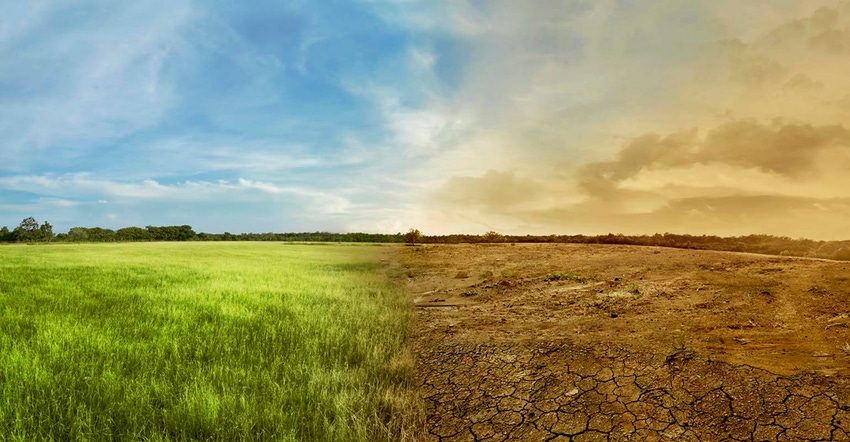November 18, 2020

An alliance of groups representing farmers, forest owners, the food sector, state governments and environmental advocates has unveiled a set of recommendations to guide the development of federal climate policy.
The Food and Agriculture Climate Alliance, or FACA, was formed in February 2020 by four groups that now co-chair the alliance: American Farm Bureau Federation, Environmental Defense Fund, National Council of Farmer Cooperatives, and National Farmers Union. The alliance has since expanded to include FMI – The Food Industry Association, National Alliance of Forest Owners, National Association of State Departments of Agriculture, and The Nature Conservancy.
Together, FACA developed more than 40 recommendations based on three principles:
agricultural and forestry climate policies must be built upon voluntary, incentive-based programs and market-driven opportunities;
agricultural and forestry climate policies must promote resilience and adaptation in rural communities; and
agricultural and forestry climate policies must be science-based.
Overview of climate policy recommendations:
Provide voluntary, incentive-based tools and additional technical assistance for farmers, ranchers and foresters to maximize the sequestration of carbon and the reduction of other greenhouse gas emissions, and increase climate resilience.
Foster the development of private sector GHG markets. The public sector should ensure that verifiable reductions occur and provide farmers and forest owners with the technical support needed to participate.
Use an array of public and private sector tools to incentivize agricultural and forestry producers to prioritize and scale climate-smart practices.
Incentivize farmers to reduce energy consumption and increase on-farm renewable energy production, and make continued progress toward reducing the lifecycle GHG emissions of agriculture- and forestry-based renewable energy.
Reduce the GHG impact of food waste and loss by streamlining confusing consumer-facing packaging and implementing a public-private partnership to achieve a meaningful and workable food date-labeling program.
Increase federal investment in agriculture, forestry and food-related research substantially and continuously.
Read the full recommendations at www.agclimatealliance.com. They cover six areas of focus:
Soil health,
Livestock and dairy,
Forests and wood products,
Energy,
Research, and
Food loss and waste.
“While agriculture and forestry are uniquely affected by the climate crisis, they are also a key part of the solution," said Sen. Debbie Stabenow, D-Michigan, ranking member of the Senate Agriculture Committee. "We need to significantly scale up sustainable practices on farms and in forests that benefit producers and address the climate crisis. It’s great to see agriculture, forestry, and environmental leaders teaming up to advance commonsense climate solutions. I look forward to reviewing their recommendations and working with them to enact many of these policies into law.”
What FACA members are saying
“We are proud to have broken through historical barriers to form this unique alliance focused on climate policy,” said Zippy Duvall, FACA co-chair and American Farm Bureau Federation president. “We began discussions not knowing whether we would ultimately reach agreement. It was important to me to reject punitive climate policy ideas of the past in favor of policies that respect farmers and support positive change. Our final recommendations do just that.”
“The wide array of perspectives represented in this group — farmers, ranchers, forest owners and environmental advocates — sends a powerful message to Capitol Hill about the urgent need for bipartisan climate legislation,” said Fred Krupp, FACA co-chair and Environmental Defense Fund president. “More resilient farms and forests protect the agricultural economy, reduce risk from the climate impacts that are already here and help prevent worsening climate impacts in the future.”
FACA co-chair Chuck Conner, president of the National Council of Farmer Cooperatives, said, “Much as a farmer co-op gets its strength from uniting many producers to achieve a single goal, so too does FACA. Through FACA, the food, forestry and agriculture sectors can speak with a single voice on climate and, leveraging the unique perspectives and special talents of its members, help drive the conversation about the role that the food, forestry and agriculture sector can play in addressing climate policy.”
Rob Larew, FACA co-chair and National Farmers Union president, said, “Climate change is adding another enormous variable to the already unpredictable work of farming. Every year, farmers face more frequent and severe weather events, making it just that much harder to make a profit. There are concrete actions farmers can take to build resilience to weather extremes and pull carbon out of the atmosphere, but they need strong policy behind them. The recommendations we’ve compiled are a good place to start.”
“Through authentic conversations with leaders from the climate, forestry and agriculture sectors, this group has pioneered a strategic plan to achieve our shared goal of empowering farmers to better protect and nourish our natural resources,” NASDA CEO Dr. Barb Glenn said. “With over 100 years of history in leading agriculture in the states, NASDA members know partnerships are key to successfully embarking on industry-shaping change.”
Source: AFBF, NASDA, Office of Sen. Debbie Stabenow, which is solely responsible for the information provided and is wholly owned by the source. Informa Business Media and all its subsidiaries are not responsible for any of the content contained in this information asset.
Read more about:
ClimateYou May Also Like




